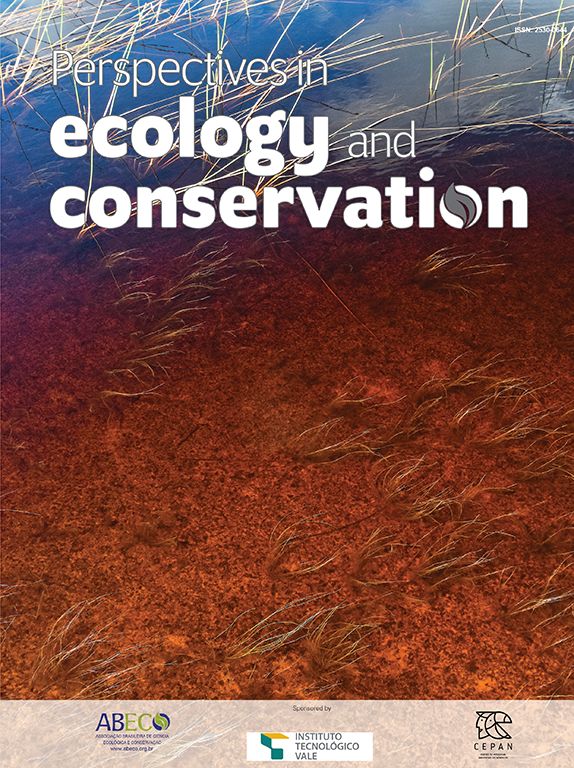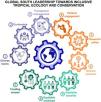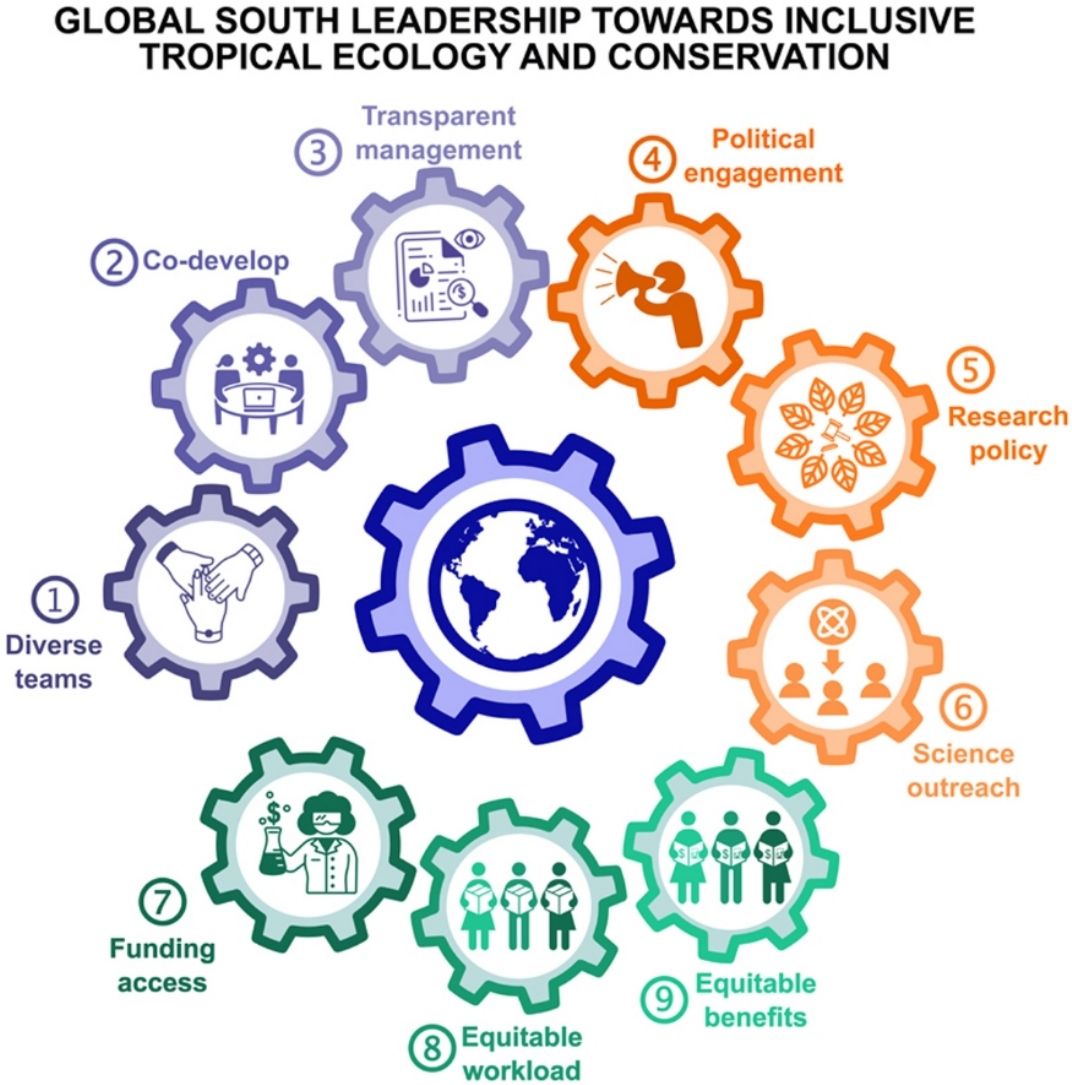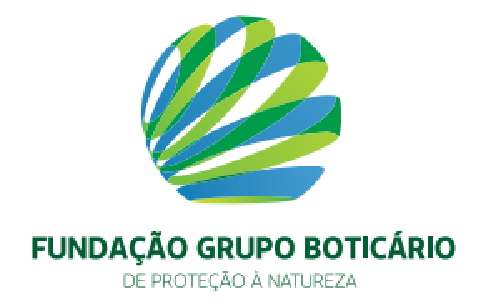Strengthening participation of Global South researchers in tropical ecology and conservation is a target of our scientific community, but strategies for fostering increased engagement are mostly directed at Global North institutions and researchers. Whereas such approaches are crucial, there are unique challenges to addressing diversity, equity and inclusion (DEI) within the Global South given its socio-economic, cultural and scientific contexts. Sustainable solutions protecting biodiversity in the tropics depend on the leadership of Global South communities, and therefore DEI improvements in the Global South are paramount in our field. Here, we propose ten key actions towards equitable international collaborations in tropical ecology, which, led by Global South researchers, may improve DEI at institutional, national and international levels. At an institutional level, we recommend (1) becoming role models for DEI, (2) co-developing research with local stakeholders, and (3) promoting transparent funding management favouring local scientists. At a national level, we encourage (4) engagement in political actions protecting scientists and their research in tropical countries, (5) participation in improving biodiversity research policies, and (6) devising research that reaches society. At an international level, we encourage Global South researchers in international collaborations to (7) lead and direct funding applications, (8) ensure equitable workloads, and (9) procure equal benefits among national and foreign collaborators. Finally, (10) we propose that Global South leadership in DEI efforts has the most potential for worldwide improvements, supporting positive long-lasting changes in our entire scientific community. Supplementary materials provide this abstract in 18 other languages spoken in the Global South.
The Global South, particularly the tropics, harbors most of the planet’s biodiversity, and yet it remains relatively understudied as compared to the Global North (Collen et al., 2008; Habel et al., 2014; and see Santos, 2016 for definitions of 'Global North' and 'Global South' used in this manuscript). Similarly, most scientific publications in tropical ecology and conservation are led by authors from just a handful of countries, with researchers and scientific institutions based in the Global South remaining underrepresented (Campos-Arceiz et al., 2018; Maas et al., 2021; Nurcahyo and Meijaard, 2018). This publishing bias is often accompanied by parachute research, in which foreign scientists researching in or about the tropics fail to involve local counterparts and share scientific outcomes and practical resources from their studies with stakeholders in the study area (Asase et al., 2022; Haelewaters et al., 2021; Maas et al., 2019; Stefanoudis et al., 2021). This lack of inclusion of local communities and other stakeholders in tropical ecology and conservation efforts is unsustainable and may result in a widening gap between research and application, in which serious threats to tropical biodiversity go unresolved, while traditional knowledge about the distribution, ecology, natural history and possible uses of tropical species remains inaccessible to the scientific community (Baker et al., 2019; Berkes et al., 2000; Muhumuza and Balkwill, 2013). Not involving local researchers and their capacity perpetuates the historical disadvantages of the Global South in science and development and can lead to further bias in scientific practices and conservation priorities (Armenteras, 2021; Pettorelli et al., 2021).
Diverse research teams benefit from the extended experience and networks of their members, increasing scientific impact and practice (Choi and Oh, 2020; Reich and Reich, 2006). Similarly, including local experts and reviewing scientific projects with local communities can scale up research applicability (Maas et al., 2019; Sheil and Lawrence, 2004), and the impacts of scientific publications (Nomaler et al., 2013). Multiple calls and initiatives are drawing attention to targeted discrimination, harassment and inequality issues within the scientific community, and the relevance of accounting for DEI in research (e.g. Baker et al., 2019; Perez and Hogan, 2018), publishing (Pettorelli et al., 2021; Ramírez-Castañeda, 2020) and implementation of tropical ecology and conservation (Maas et al., 2019; Muhumuza and Balkwill, 2013; Rudd et al., 2021). However, these recommendations target mostly researchers, educators and publishers from or based in the Global North (but see e.g. Ramírez-Castañeda et al., 2022). Whereas such recommendations are crucial, there are unique challenges to addressing for DEI within the Global South, and these vary according to the socio-economic and cultural characteristics of each nation (Ciocca and Delgado, 2017; De La Cadena, 1998; Felitti and Rizzotti, 2016; Slobodian et al., 2021).
If Global North nations are allocated the exclusive responsibility of changes towards DEI, we will be far from constructing worldwide-applicable solutions. Instead, this may perpetuate neocolonial practices in which privileged nations establish and impose codes of conduct and “best” scientific practices from a culturally-biased perspective (Pineda and Streitwieser, 2018, 2018; Soares et al., 2022). Efforts rooted in and trimmed for the needs of Global South nations are urgent if we aim to create a truly equitable community of tropical ecologists and conservationists.
International collaborations in research and practice are key for biodiversity conservation worldwide, as evidenced by many nations seeking to align their conservation priorities with international targets, such as the United Nations’ Sustainable Development Goals (Liu et al., 2017; Mason et al., 2020). For example, transboundary collaborations among tropical countries have great potential for conserving species with large distribution ranges or migratory habits (Liu et al., 2020; Marcacci et al., 2023) and North–South cooperation is expected to improve capacity-building and conservation investment in less-favored countries (Blicharska et al., 2021). However, international research collaborations are often permeated and hindered by socio-economic inequalities among nations, institutions, and researchers, even within the Global South (Blicharska et al., 2021; Boshoff, 2010). For example, although much has been written about the “parachute science” perpetuated by Global North researchers on Global South communities, there has been less acknowledgement of how similar dynamics can occur among different demographic groups within a given country (e.g. Global South researchers from wealthier urban backgrounds conducting research in poorer, rural communities). In addition, DEI considerations differ according to economic, social, and political contexts; for example, in many tropical countries, indigenous communities include uncontacted groups, which require additional thinking about who is being represented (or not represented) in conversations about tropical biodiversity and conservation.
We have gathered our expertise participating in DEI committees in international societies; our experiences in research collaborations between Global South and Global North nations; and the current body of literature in the topic to identify alternatives promoting equitable participation in tropical ecology and conservation across the world from a Global South perspective. Towards this aim, in the remainder of this article we suggest a set of actions for Global South researchers to promote DEI within their teams, at a national scale, and within international collaborations (Fig. 1). We discuss how these actions add up to international efforts for increased and equitable participation of Global South researchers—and marginalised groups among them—in tropical ecology and conservation.
Ten direct actions for Global South leaders to improve DEI in international collaborationsInstitutional level1. Be a role model for DEIDiscrimination towards ethnic minorities or underrepresented ethnicities, women and other historically marginalised groups is as pervasive within education and research institutions in the Global South, as in the Global North (e.g. Barrantes, 2020; Canessa, 2007; De La Cadena, 1998; Felitti and Rizzotti, 2016; Gaentzsch and Zapata-Román, 2020; Slobodian et al., 2021; Tapia-Jáuregui and Jiménez-Santofimio, 2017). Therefore, it is a responsibility of ecology and conservation leaders in the Global South to promote a scientific community that is representative of the vast demographic diversity and points of view that exist at the national and regional levels. All members of the community should have fair access to participating in research teams, as well as on boards and leadership roles.
We encourage frequent self-assessments of personal privileges and discriminatory prejudices (de Vos, 2022), and pressure for research and education institutions in the Global South to develop and improve formal DEI policies, including clear codes of conduct (Ramírez-Castañeda et al., 2022; Tulloch, 2020); trained arbiters (e.g. ombudspersons) and neutral committees to address conflicts and complaints. These policies should guarantee mechanisms to safely raise concerns about DEI, and mentoring programs that promote the creation of a comfortable and secure climate for all (Casad et al., 2021).
2. Co-develop and communicate your research with local stakeholdersThe limited inclusion of local stakeholders by Global North researchers, resulting in parachute science, has been widely criticised (e.g. Baker et al., 2019; Nokmaq et al., 2021; Salomon et al., 2018; Ybarra, 2018). However, we must recognize that parachute research practices also exist within Global South countries, especially when access to higher education and capacity-building concentrates in large cities (Akshay and Demon, 2021; de Vos and Schwartz, 2022). Research and practice of tropical ecology and conservation can profit greatly from diverse working teams, including local specialists, e.g. “paraecologists”, with empirical knowledge of local ecosystems and biodiversity (Schmiedel et al., 2016; Sheil and Lawrence, 2004). Co-developing research projects and discussing outputs with local communities maximise their applicability and impact while honouring the sovereignty of local communities over their territory and resources, and guaranteeing long-lasting relationships based on trust (Toomey et al., 2019). Respectful engagement of local communities includes their active participation and feedback at multiple stages, getting permissions and co-developing research questions; collaborating with and hiring locals, and building capacity during data collection and processing; openly discussing partial and final research results, and adapting research and participatory practices accordingly (e.g. Arce-Plata et al., 2020; Danielsen et al., 2007; Maas et al., 2019; Ramírez-Castañeda et al., 2022; Toomey, 2016). Cross-disciplinary approaches in which ecological expertise is complemented by knowledge from other disciplines about intercultural dialogue can support this goal, and guarantee integration of traditional knowledge from local stakeholders (Campbell, 2005; Kainer et al., 2006; Maas et al., 2021).
3. Promote transparent funding management favouring local researchersResearch institutions worldwide have increased bureaucratization, in order to standardize institutional practices and comply with international standards (Clavijo, 2022; Muñoz, 2019). However, this has resulted in overly-complex processes and formalities that take researchers away from investigation and teaching, and implies a large economic and workload investment from institutions (Clavijo, 2022; Coccia, 2009). Notably, in our experience, processes to obtain the documentation needed to apply to and administer grants are often unclear and time-consuming in Global South institutions. This hinders the completion of scientific research projects, the maintenance of international collaborations that follow strict project deadlines, and the access of researchers in the Global South to international funding opportunities (Merkle, 2017). Therefore, it is urgent that institutions in the Global South develop transparent policies for the management of research funding, which guarantee access to research money that has been obtained, as well as mechanisms to trace money use. Such policies must be developed with a focus on reducing administrative tasks for researchers, and guaranteeing equitable benefits for national and international researchers. Developing such standards often requires the development of brand-new policies and administrative teams, such as ethics committees, which is costly in both money and time (Hydén, 2016; van Helden, 2012). However, it offers a possibility to increase the awareness of administrative staff about the requirements and opportunities to obtain research funding, and its benefits for institutional growth.
National level4. Engage in political actions to protect scienceGlobal South ecologists have increasingly voiced concerns about limited financing, employment opportunities and legal protections for scientists in tropical and subtropical countries (Carosso et al., 2019; Escobar, 2019; Kwasi-Agyeman et al., 2020; Metzger et al., 2019). The low investment in science and education among Global South governments contributes to poverty and social inequality (Carosso et al., 2019) and increases “brain-drain—i.e. the migration of trained scientists to foreign nations with more employment opportunities (Ciocca and Delgado, 2017). Guaranteeing a stable national budget for science and political independence for research institutions may prevent scientific research from being affected by rapidly-changing political interests (Quintans-Júnior et al., 2020) or other crises such as pandemics (e.g. Reidpath and Allotey, 2020). This will be paramount at a global scale to guarantee scientifically-informed actions to counteract climate change, and to protect the tropical biodiversity upon which human communities depend (e.g. Fünfgeld, 2021; Magnusson et al., 2018).
We encourage Global South ecologists and conservationists to continue engaging in policy development, participating in forums, press communications and interactions with politicians, urging national governments to recognize the relevance of biodiversity research and education, as well as environmental and conservation leaders. Direct changes in the political systems of a country can be beyond the scope of ecologists’ jobs, but it is our responsibility to our colleagues, mentees and research fields to continue advocating for policy changes that prioritise science and biodiversity protection. As a first step, this requires policy adjustments that ensure protection of ecology and conservation researchers, practitioners, and their institutions from possible political retaliation.
5. Advance biodiversity research policiesBureaucratic processes to obtain research permits often take considerably longer than expected, do not completely follow the stated regulations (e.g. Nemogá-Soto and Rojas-Díaz, 2009; Vásquez-Restrepo, 2021), and become obstacles for the study and conservation of nature all around the world (Acosta and Pérez-González, 2019; Neumann et al., 2018). This hinders the success of national and international research initiatives in tropical ecology and conservation, since the timelines to obtain a permit are often not in line with those demanded by research projects and funding agencies. In contrast, engaging in the creation and improvement of laws related to research permits may allow Global South researchers to guarantee the consideration of realistic deadlines for scientific research, and the compliance of tropical biodiversity protection (e.g. Ragamustari and Sukara, 2019). A good example for this is the National Biodiversity Mission from India, which has allowed the development of new policies, covering biodiversity management and conservation, ecosystem function and the management of data from these fields. These policies should favour access to genetic resources and other biodiversity samples by national researchers and explicitly discourage parachute science by demanding the participation of local researchers in projects involving international scientists/institutions (de Vos and Schwartz, 2022). Within such international collaborations, local scientists may lead the obtention of research permits and access to tools and information that require that foreign researchers become familiarized with and abide by local regulations (Fukushima et al., 2021; Renner et al., 2012).
6. Devise research that reaches societyImproving the quality and perception of science at a national level requires broadening the accessibility of scientific knowledge to the wider public. Outreach activities should be a priority for all ecologists, conservationists and their institutions, and international collaborations should be permeated with this thinking. Great examples include the multiple campuses and outreach activities from the Universidad Nacional de Colombia, which have contributed to decentralise professional education in the country, and the inclusion of students from underrepresented regions (https://unal.edu.co/sedes), as well as environmental advice and consultancy, and dissemination activities that improve the recognition of national scientific advances and scientists’ connection with local communities (Salomon et al., 2018; Toomey et al., 2019).
Decentralising science opens the opportunity for knowledge co-production with relevant stakeholders, such as local communities and NGOs, politicians and private companies (Salomon et al., 2018). Moreover, this can encourage the creation of community-based conservation initiatives, including biodiversity monitoring (e.g. Şekercioğlu, 2012 and Biodiversity Observation Networks) and surveys for prioritising areas and methods for nature conservation (e.g. Zapata and Rondán, 2016). Additionally, the decentralization of science can potentially increase opportunities for discussions about the role of scientific research and accessibility in society (e.g. Bonney et al., 2016; Frigerio et al., 2018).
International level7. Lead funding applicationsThe limitations for equitable participation of Global South researchers in international collaborations have been widely discussed, particularly with regard to the lack of funding opportunities and insufficient training (e.g. de Grijs, 2015; Haelewaters et al., 2021; Maestre and Eisenhauer, 2019; Sheil and Lawrence, 2004). Whereas efforts to increase alternatives and coverage of education and research funding for the Global South remain scarce, they have increased in recent years (e.g. Elsevier Foundation or the European Grants for Overseas Countries and Territories). Moreover, some funding opportunities are specifically targeted at international collaborations, even including exploratory visits to potential partners abroad and allowing proposals in several languages (eg. WWF funding). Ecologists and conservationists in the Global South may take advantage of these opportunities and lead applications to research grants, guaranteeing their direct access to funds and equitable benefits for national and international collaborators (Asase et al., 2022). Taking leadership in funding applications may imply increased workloads, related to both identifying funding opportunities available for Global South researchers, and adapting research proposals to their specific standards. However, beyond additional workloads, it may enable early and well thought collaborations with foreign researchers, and growth in the funding alternatives to promote them. Moreover, it makes it possible for funding agencies to familiarize with the characteristics and needs of funding recipients in the Global South, hopefully improving requirements for grant applications with a perspective of increased DEI (Escobar Álvarez et al., 2021). Currently, funding that supports the development of participatory research collaborations and the co-creation of research questions and methods between Global South and international researchers is scarce. This neglects the time and effort necessary for collaborative research, and the possibility that it is actually based on shared interests. An increase in the availability of research awards for the initial steps of international research agreements has the potential to increase scientific collaborations across different cultural backgrounds.
8. Protect your work and be respectful of others’ contributionsGlobal South leaders in ecology and conservation have voiced concerns about tokenism—e.g. inclusion in collaborations to comply with DEI requirements but limited to a symbolic role—and unequal workload distribution in international research collaborations (e.g. Armenteras, 2021). Global South researchers are often expected to perform the most strenuous fieldwork activities collecting ecological data, while Global North researchers lead data analysis and writing and therefore often claim first authorship in derived scientific publications (Seidler et al., 2021). Equitable collaborations should guarantee comparable task distribution, in which all team members performing different tasks related to ecological research—planning and executing field activities, processing samples and data, analyzing data and preparing manuscripts, among others—are equally recognized and respected. Global South researchers should continue voicing concerns about equitable workload distribution within international collaborations and advocate for transparent agreements from the planning stages of international research projects. Such agreements must become an official written component of collaborations with explicit spaces for discussing and updating them during the course of projects (Baker et al., 2019; Maestre and Eisenhauer, 2019; Parker and Kingori, 2016).
Comparable team structures in international collaborations may prevent hierarchical interactions between national and international team members. Maintaining comparable budgets and the same number of national and international graduate students, principal investigators, and research assistants may increase the probability of a fair distribution of economic resources for national and international team members, accounting for differences among international currencies. Moreover, opportunities for peer-to-peer engagement between national and international collaborators must be frequent to support equitable knowledge exchange among team members (Maestre and Eisenhauer, 2019).
9. Guarantee equal benefits for all collaboratorsEffective biodiversity conservation worldwide is currently limited by knowledge gaps about the most biodiverse areas on our planet, particularly tropical regions (Amano and Sutherland, 2013; Elias et al., 2007). Filling these gaps relies to a large degree on long-term data which can only be obtained with leadership of local scientists and communities, and therefore high-quality capacity-building for these communities must become a focus of international collaborations. Currently, Global South researchers have limited access to top-notch tools, equipment and training for research, which in turn hinders their access to international funds and collaborations. Whereas many of these issues are related to inequalities in international economy and trade (van Helden, 2012), international collaborations should include mechanisms that reduce disparities among team members. Advocating for equitable payment, access to high-level training, scientific literature, technology (e.g. software licences) and equipment must be a priority of Global South leaders involved in international collaborations, and their counterparts must be open to acknowledge and handle such needs. Similar scientific benefits from research may improve the participation of the Global South in ecology and conservation by making researchers and students in the region competitive vis-á-vis international standards. For example, broadening current hegemonic criteria for co-authorship in scientific manuscripts allows recognition of fundamental tasks for research that go beyond data collection and analysis (Cooke et al., 2021; Maestre and Eisenhauer, 2019).
10. Integrate actions with global DEI effortsOur manuscript has highlighted key actions for researchers from the Global South to improve diverse and equitable inclusion in tropical ecology and conservation. Such recommendations complement many resources already proposed to prevent discrimination and limited opportunities for underrepresented ecologists and conservationists. We are aware that the actions mentioned here are insufficient to completely account for DEI issues in this field, and that there are additional challenges specific to situations in the Global North, or which are shared globally (e.g. Asase et al., 2022). Active efforts to develop personal, institutional and international mechanisms that recognize the different needs of researchers are essential to guarantee fair international research collaborations that maximise, above all, benefits for the protection of tropical biodiversity. Therefore, giving an active voice and role of underrepresented communities in decision-making processes is pivotal. Representation of the Global South into international discussions about ecology and conservation—such as forums, policy meetings and scientific conferences—are key to improving our practices and to highlight the often-overseen work of Global South researchers. Acknowledging tropical ecologists’ and conservationists’ opinions based on their actual experience with tropical biodiversity will be necessary for making well-informed decisions and policies. This will be paramount for true and long-lasting improvements in our scientific community and in biodiversity conservation.
ConclusionOur manuscript suggests 10 specific actions that tropical ecology and conservation researchers based in the Global South can lead in order to support DEI initiatives. These actions require effort, increased self-awareness and a willingness to compromise, and we expect they are mirrored by similar self-awareness and willingness to compromise from those in privileged positions and nations around the globe. We are confident that such investments will further support tropical nature conservation and our scientific community. Our proposed actions at the institutional scale have the potential to transform research communities into teams that genuinely represent the diversity of people and perspectives present across the Global South. By scaling these initiatives at national and international levels, we expect that decision-makers in tropical ecology and conservation will become more representative of those living in and with tropical megadiversity.
A wave of change is arriving in the scientific community, with efforts from journals, education institutions, funding bodies, and researchers themselves to make tropical ecology and conservation more inclusive. For example, quantitative assessments of the human diversity represented by editorial boards and authors have been recently performed by several well-recognized journals, thus documenting the need for the further inclusion of Global South researchers as leaders in global conversations about biodiversity and conservation (Campos-Arceiz et al., 2018; Hazlett et al., 2020; Maas et al., 2021; Pettorelli et al., 2021). We call on Global South researchers to take charge of additional DEI efforts and shape the way that equity and inclusion is discussed at a global scale. Our research and the conservation of tropical biodiversity can only benefit from this.
This manuscript started through discussions with the Functional Agrobiodiversity group at the University of Göttingen, and we are grateful to all members for their valuable feedback. We also thank Evert Thomas and Brenton Ladd for their frequent reminders of the relevance of diversity and inclusion in scientific research in the tropics. We are very thankful to the associate editor and one anonymous reviewer for their feedback about the manuscript.
We are thankful to Yan Yan from Westlake University, Philipp Arimond, Riko Fardiansah, Oussama Ait Hmida, Osama Adel, Héloïse Marcacci and Francisco d'Albertas Gomes de Carvalho for their help and advice with translations in Chinese, Bahasa Indonesia, Arabic, and Portuguese. We are also thankful to AfroLingo for their assistance with translations to African languages. Other language translations of the abstract and figure were made with the help of DeepL software and Google Translate.





























